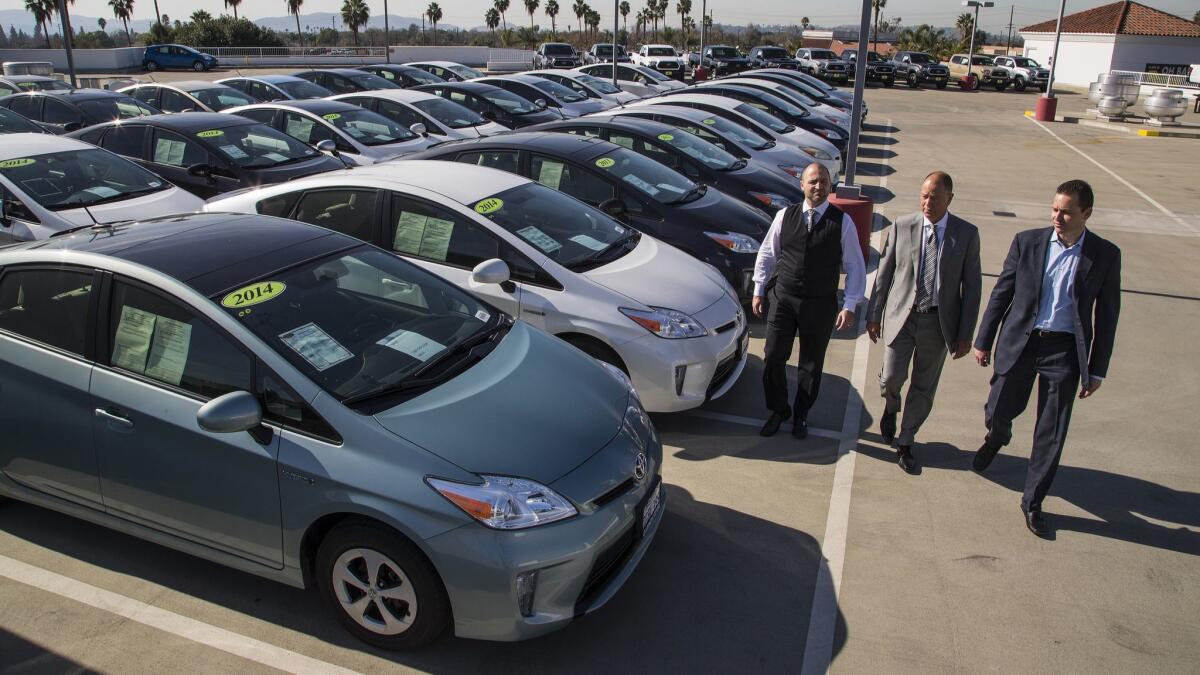Toyota issues a safety recall for 2.4 million Prius, Auris hybrids to fix a defect in their electronics

- Share via
Toyota said Friday that it is recalling 2.4 million hybrid gas-electric cars, mostly Prius models, around the world to fix an electronic defect that causes the vehicles to suddenly lose power and could “increase the risk of a crash.”
The recall in the U.S. includes various Prius models that were built from 2010 to 2014, the same cars that were recalled earlier and fixed with a software update that lawsuits allege was not effective in preventing power losses.
Hundreds of Prius owners have filed complaints with dealers, the government and the news media. The Times first disclosed the problem in a series of stories earlier this year.
In a notice issued to U.S. dealers on Friday, a copy of which was obtained by The Times, Toyota said the electronic defect could cause a sudden loss of power that would “increase the risk of a crash.” It was the first time the company has acknowledged that the earlier recall still left owners unsafe.
The Toyota recall affects 807,000 vehicles in the U.S. and 1.25 million in Japan, including some models of the Auris, a lesser-selling hybrid. Toyota announced the recall in Tokyo, saying it had received three reports in Japan from owners about the stalling.
Toyota said it is developing a remedy, which will be another software update.
Toyota has been sued in Southern California by a dealer, Roger Hogan, and faces a suit seeking class-action status. Those suits allege that the earlier recall did not fix the defect. A trial date for the dealer’s suit has been set for next year.
The Prius hybrid system depends on a shoebox-size device, known as an inverter, that boosts voltage from the vehicle’s battery to its motors and then reduces the voltage when the brakes recharge the battery.
The inverters have been overheating, causing the software that controls the vehicles to shut down the power or put the vehicle into what is known as a limp-home mode that is supposed to allow drivers to get to the side of the road safely.
The problem seems to emerge when a driver puts a high load on the hybrid system during accelerating or braking. The limp-home mode or fail-safe mode was touted by Toyota as a safety feature. But in its reporting on the matter, The Times interviewed and exchanged emails with a few dozen Prius owners who said they lost power on freeways and had to take evasive action to get clear of traffic.
In a news release Friday, Toyota acknowledged that the vehicles sometimes do not go into limp-home mode at all, but lose all power.
“Toyota has found that in rare situations, the vehicle may not enter a fail-safe driving mode as intended,” the statement said. “If this occurs, the vehicle could lose power and stall. While power steering and braking would remain operational, a vehicle stall while driving at higher speeds could increase the risk of a crash.
“This recall provides a remedy to address a new condition in the vehicles involved in the previous recalls announced in February 2014 and July 2015. The previous recalls did not anticipate this new condition remedied with this recall. To address this issue, Toyota dealers will update the software for all involved vehicles, at no charge. Toyota will notify the involved customers once the software update is available.”
In late 2017, Hogan filed a petition with the National Highway Traffic Safety Administration that alleged the earlier recall in 2014 had failed to remedy the problem and that he was seeing cars that had melted electronic components after the software fix had been installed. Hogan also stopped selling the used Prius models he had taken as trade-ins, storing 70 of them at his two dealerships. Hogan still is not selling the used vehicles.
Hogan has been calling for Toyota to replace the inverters with a newer model, a fix that could cost as much as $3,000 per vehicle. If applied to the entire fleet of recalled vehicles, it would exceed $8 billion, according to Skip Miller, Hogan’s Los Angeles attorney.
“This is an admission that the prior recall did not work,” Miller said. “It validates Roger Hogan putting a stop sale on the cars, and it validates the lawsuit.”
Toyota has never disclosed how the software update would prevent overheating in the inverter, but academic engineering experts surmise that it is probably reducing the amount of electrical power moving through the inverter. It raises the potential, they said, for the vehicle to increase its reliance on the gasoline engine, thereby reducing fuel efficiency and increasing emissions.
NHTSA began an inquiry into the matter but never announced that it had advanced its review to either start a preliminary evaluation or a defect investigation. The agency would not say Friday whether it is continuing its inquiry or has closed the matter, though it did issue a statement.
“NHTSA has been closely reviewing complaints and other information provided by the public, and has been in consultation with Toyota prior to today’s recall announcement,” it said. “Owners of recalled model year 2010-2014 Prius and model year 2012-2014 Prius V vehicles should get the free repair when notified by Toyota.”
Hogan said in interviews earlier this year that he had serviced more than 100 Prius models that received the software update but had overheated inverters and had lost power.
Toyota sales of Prius vehicles have fallen sharply from the early years when it pioneered the entire class of hybrid vehicles with stunning fuel economy. But other manufacturers are now offering hybrid vehicles and plug-in electric vehicles that do not require any gasoline at all.
Twitter: @rvartabedian







